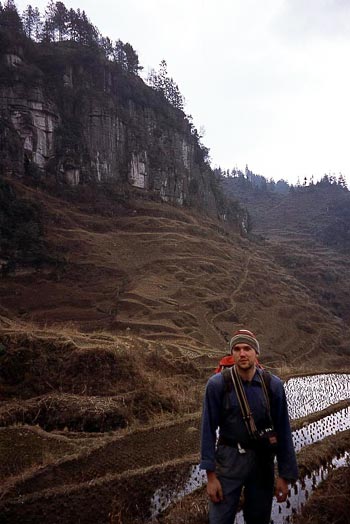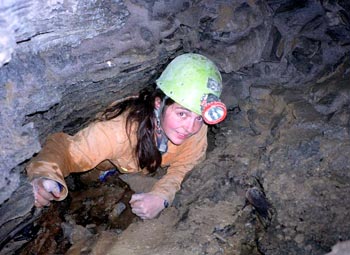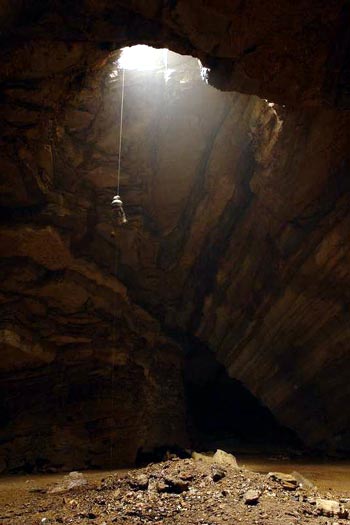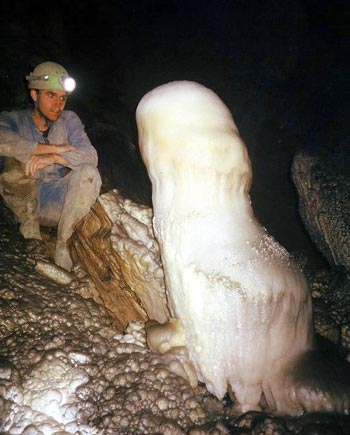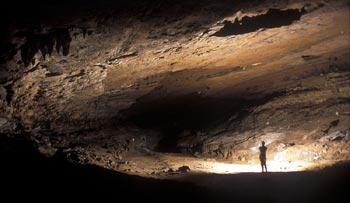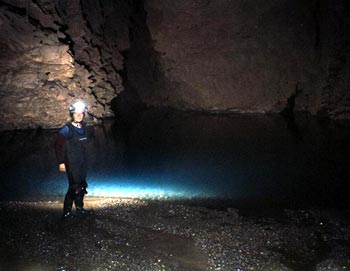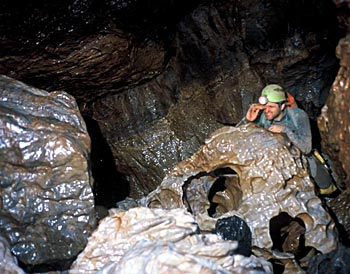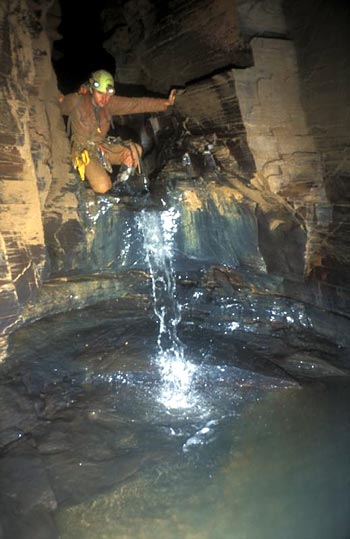| Home / Environment / Public Endeavor | Tools: Save | Print | E-mail | Most Read |
| Cave On - 2 Foreign Explorers Obsessed with China's Caves |
| Adjust font size: |
The differences between mountaineering and caving are more than simply deciding whether to scale a lofty peak or plunge into the bowels of the earth, explains 30-year-old Lynch. Caving poses more challenges since you are advancing into an unknown world with no knowledge of what you may come across, she adds while bringing up CG shots of caves she has explored in China. Furthermore, interjects her partner Duncan Collis, caving is far more accessible since it is informal in nature. Cavers simply need to be aware of safety methods and be thoroughly trained instead of signing up with an expensive profit-earning mountaineering group.
Duncan Collis in Wulong, Chongqing The caves first called to Lynch back in 1998. As a member of Cambridge University Caving Club, Red Rose Cave and Pothole Club (Hong Meigui), Southern California Grotto, and the National Speleological Society, she also volunteered for the Cave Research Foundation. She has since traveled the world, caving in the US, the UK, Ireland, Austria, Spain and Mexico. In 2000, Lynch received a grant from the Durfee Foundation's American/Chinese Adventure Capital Program to explore caves in China for a year. Her love for the country blossomed and she decided to stay here after her year concluded. 32-year-old Collis began caving in 1994, also with the Cambridge University Caving Club and has since become a member of the British Cave Research Association. Now, Lynch carries out research for the Guilin Karst Institute while Collis teaches English, although both of them still spend most of their time exploring and mapping out south China's caves.
Lynch has been mapping caves in China for over six years Collis explained: "For the past six years, we have been caving in China as the caves here are so dramatic and varied." Lynch added that 49 of the 73 documented tiankengs worldwide are in China. A tiankeng refers to a large sinkhole, measuring at least 100 meters in diameter and 100 meters in depth. The Wulong Karst boasts some of the world's finest examples of eroded and collapsed tiankengs which, along with integrated morphologic features, provide strong evidence of geological evolution.
Tiankeng "The deepest cave system in China is also in Wulong: the Qikeng Dong which reaches up to 920m in depth," Duncan recalled with audible enthusiasm. "I spent five days down there and went over 800 meters down. When I surfaced, I had never found the freshness of the air and the smell of grass so pleasant." What differentiates Lynch and Collis from common sports fans is the whole-hearted devotion they have for caving, describing it as more of a "career rather than a sport or hobby." Back in 2001, Lynch and two friends founded Hong Meigui, an international society dedicated to exploring caves in China with Collis coming on board a year later. Since its inception, members of the society have mapped over 245 kilometers of cave passages including China's three deepest potholes and the largest and deepest conglomerate cave in the country. Hong Meigui supported by the Durfee Foundation has now grown to include 100 members from 14 countries. Another impetus is provided by the scientific research that Hong Meigui's caving enthusiasts carry out. In 2001, Lynch and Collis met Prof. Zhu Xuewen, chairman of the Geological Association of China's Speleology Committee, who found the Wulong Houping Tiankengs, the first eroded tiankengs in the world. Prof. Zhu has been involved in collating scientific data on the Furong Dong/Furong Jiang, Sanqiao Natural Bridges and Houping Erosional Tiankengs, the three component parts of the Wulong Karst which have jointly applied for World Natural Heritage status along with Shilin Karst in Yunnan and Libo Karst in Guizhou. From this fortunate meeting, Lynch and Collis began working for the local government in mapping the cave complexes. Anyone interested in following this intrepid duo's explorations, along with other members of the Red Roses, can visit their website (www.hongmeigui.net) which is updated with their latest expedition developments. "The website contains statistical details about the caves we explore, the rare minerals they contain and the sub-surface fauna living there such as blind fish and loach," revealed Lynch, adding that it also acts as a log to inform the worldwide speleological community about the latest developments in their research and surveying. The Wulong County officials welcome foreign cavers, and so do the local villagers who have helped find several nearby caves, revealed Collis. "People here are pretty friendly and helpful such as when we visited Zhonglin Village and Erwang Dong Village, they came forward to show us the caves," he noted, adding that the villagers realize the potential tourism appeal of the caves.
Dine with the locals However, Collis cautioned, tourism in the area must be developed conscientiously in order to preserve fragile and unique biological and environmental eco-systems. So far, Wulong seems to be heeding this sage advice. Only half of Furong Dong cave passages are open to the public; 2.5 km of the Sanqiao gorge are open with the rest closed off for protection; while Houping has wholly remained an isolated farming community. Furthermore, in the interests of conservation, the local government has created a heritage management office to supervise the area along with the annual 13 million yuan protection fund budget. South China Karst will be considered at the 31st World Heritage Conference occurring in late June in New Zealand, but a victory has already been secured since obtaining a spot on the list automatically secures better protection, raising the fragile eco-system above a mere popular tourist landmark. Their work on the Wulong Karst application to the World Heritage has now ended but Lynch and Collis' passion will not end here. Lynch will now return to California to finish her graduate thesis in June while Collis will fly down under for new challenges in freshly-discovered Austrian caves. However, their fascination with China's caves will see them come back before long. "We can't afford either a space trip or a submarine adventure. Caving was our only choice," joked Lynch. More caving photos contributed by Lynch:
(China.org.cn by staff reporter Li Xiao, April 18, 2007) |
| Tools: Save | Print | E-mail | Most Read |
 |
| Related Stories |

